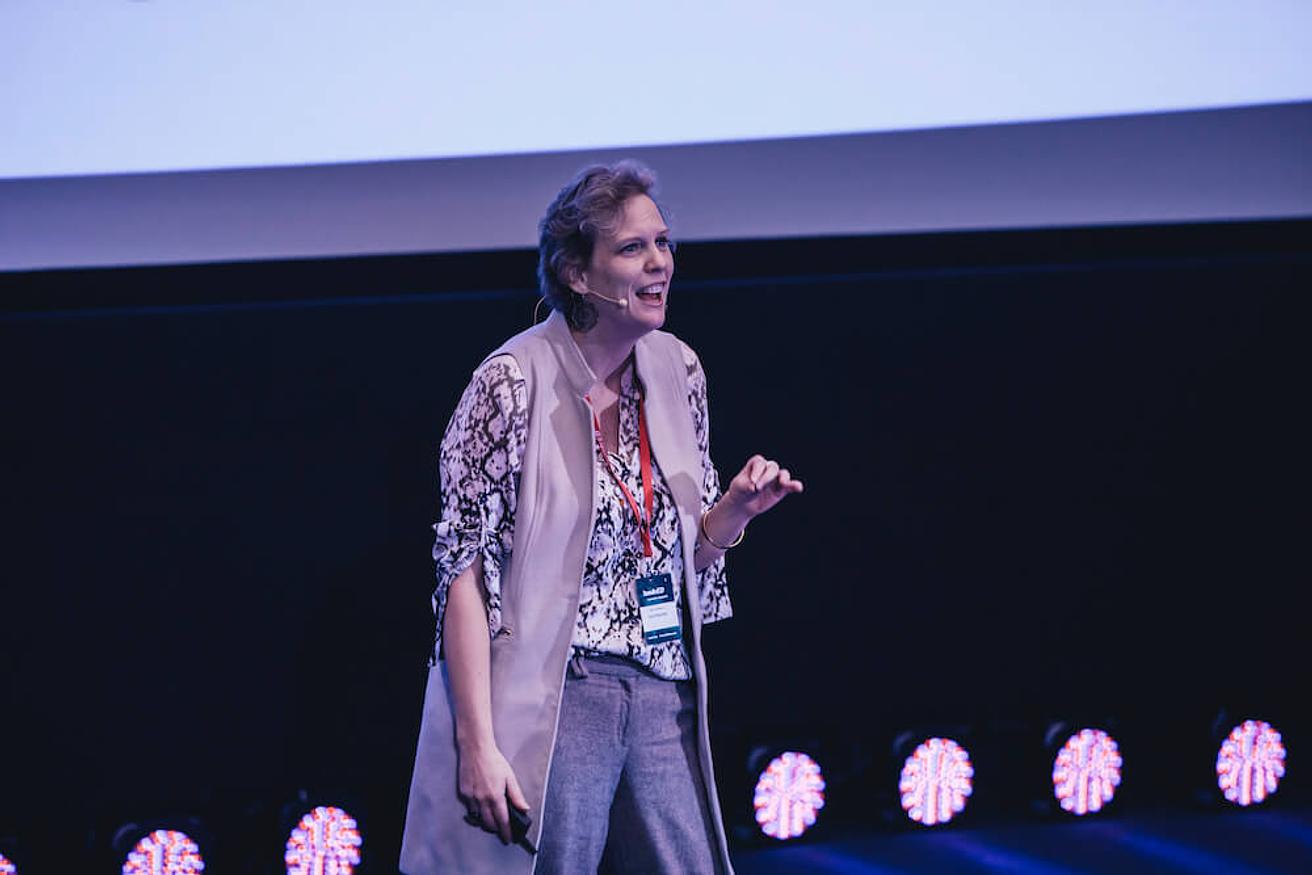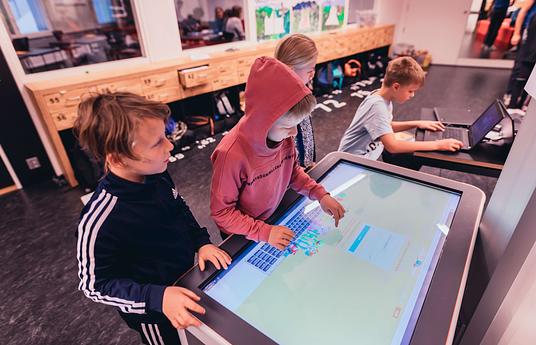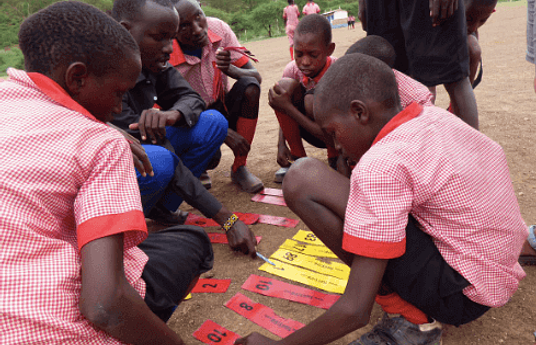Sarah Bouchie is the Vice President of Global Programmes at the LEGO Foundation. The LEGO Foundation is committed to re-defining play and re-imagining learning to ensure children develop the skills needed to navigate an uncertain and complex world. They believe that hands-on, minds-on learning is the best way for children to be able to develop into their full potential and become creative, engaged life-long learners.
How do you select which organisations to fund and partner with?
The LEGO Foundation goes through a pretty rigorous process of thinking about what kind of problems we want to try to solve. How can we best promote systems, governments, teachers, and parents to change in a way that adopts knowledge, attitude and behavior change around learning through play? Because we’ve spent so much time thinking about what problems we want to solve, we want to look for partners that share that same analysis of the problem, and the same clear value that the best way children learn is through hands-on, minds-on learning in a playful way. We have spent a lot of time thinking about evidence and research around the way that children learn. We have defined very clearly for ourselves five characteristics of learning through play, and it's important to us that our partners really believe that those are also the best ways that children learn. Once we find partners that share our values, we want to make sure that they also understand and think about impact in the same way.
When we think about impact, it's at a systems-level so we are looking at long-term change and shifts in the ways that systems work. That means that impact has to be significant and meaningful for the audiences that we are trying to reach. It also has to be sustainable, meaning we have to be able to think about it persisting long beyond when the LEGO Foundation funds something; and finally, it has to be lasting, where the impact itself is carried through and durable for the participants in the programs. If we can find partners who both believe in what we want in terms of learning through play and also share that same vision around impact, it's often a great match. The foundation also focuses on certain geographies, and then we look to see if there are global innovations or activities that we can provide in order to bring insights to bear or research to bear or ways to remove barriers to bear, on these specific problems.
We are looking for both systems that are at a tipping point, where we can catalyze action, as well as interventions that are ready to be amplified in many different ways. We are looking for partners who can help us to do those things. It’s difficult sometimes to find partners who both believe in everything that we do and where there is a co-creation process, where we learn and develop. As long as we stay focused on evidence and really trying to find out what works and finding evidence broadly, then there is a lot of room to produce the kinds of programs, advocacy, and buy-in we need in order for those programs to take root.
Any helpful learnings regarding your past investments?
One thing that we have learned over and over again, is the importance of understanding context. As we find things that work, we want to be able to understand for whom, how and why. That means you need a pretty rigorous way of thinking about implementation research, of doing learning loops, and staying abreast of those things because your context changes. But importantly, as we try to take innovations and move them to different places, we need to understand what is the core of what you are trying to do and seeing if we have the same populations that we are trying to reach in the same context and in the same systems. That is difficult and sometimes we do it better than other times, and I think leaving that space for reflection and iteration, and the small prototyping cycles where you can continuously build, and test and learn, is important.
On the other side of that, we need to think about evaluation and making sure that you are applying the right evaluation method at the right time. If you are at the point where you are still developing your content and refining what your model looks like, it's important that you have learning loops that are quick and rapid and can give you fast feedback. When you have a model that you feel is pretty strong, then a more rigorous evaluation where you can look at a set of objectives and maybe even do it in a more controlled way is appropriate. But as you scale, you don't want to keep that as your model; you want to have a different set of learning loops that are maybe both bigger and smaller at the same time. I think getting that right is difficult. As funders, too often, we want to prove that something works and when you try to prove that something works, you often don't give it enough time to work before you do that proving. That is not an efficient use of people's time and money, and sometimes it can be frustrating in a process that actually has a lot of good to it.
How do you see the impact of you and your partners’ collaboration?
The foundation is so proud and clear about its mission to promote learning through play that all of our partners, whether we funded them and they have graduated from us or they have moved on; they are still a part of that movement, and a part of the learning network, as ambassadors, advocates, and as evangelists, for the kinds of things that we feel are really important. As a foundation, we want to keep them close and sometimes that means giving them the kind of support they need to move from one level of performance to scaling or spreading or inspiring in a whole different way. It can mean an institutional relationship that is helping them to really think about how they can build their business model in another way. On the other hand, it might be connecting them to partners or governments or other actors.
Are there any ideas that you would like to fund but are not seeing?
There are so many ideas that have not been thought of. Of course, there are things that we would like to see. One of the things that is important for us is that as we as a society start to value our breadth of skills, that the purpose of education systems can bring that breadth of skills to bear for children in different ways; programs or projects that are really thinking about how to bring parents and teachers to the table and make systems change happen in playful ways. We have plenty of examples, but it's never enough and there are too many children that are looking for solutions so I think ways to do that and ways to do it at a scale that is meaningful to help tip these systems over a certain threshold is really important to us. We can use more actors in that space.
What can HundrED do to help you in your work?
I think one of the things that is really unique and inspiring and exciting about HundrED is the ability to look at such a global landscape and be able to pull out these pockets of really exciting ideas and the enthusiasm that comes along with that. I think there is one thing about how do we find the best of those and cluster them in ways that allow us to make a bigger impact but also where are the ideas that are about inspiring others or that are started but then entrepreneurs or innovators are ready to let go of them and let somebody else take them to the next step. Because the LEGO Foundation is really focused on scaling things, it is difficult to go from incubating an idea to doing it at a wide-scale. For us, HundrED helps us to play a role of finding who those incubators are and then thinking about different paths and that can be clustering different ideas together which inspires us or it can be actually saying here is something that has a lot of promise and it just needs a bigger platform than maybe it's originator can provide.
How can you contribute to the HundrED Community?
The LEGO Foundation overall sees ourselves as a catalyzer and a convener in many ways as we try to promote the best of what we know around knowledge of what works and what doesn't, and bringing people together. That is something that HundrED does, and is also very congruent with the LEGO Foundation’s activities. Because we are a funder who has had a strong breath of a portfolio from social entrepreneurs to working with governments, and very large scale providers, we have experiences there that we can share about what are the comparative advantages and how one can sharpen that in each of those different spaces. So those are things we can offer the community here, in line with what HundrED is trying to do.
HundrED and The LEGO Foundation have teamed up to shine a Spotlight on education initiatives from around the globe that are fostering creativity. Learn more on their Spotlight Page.


